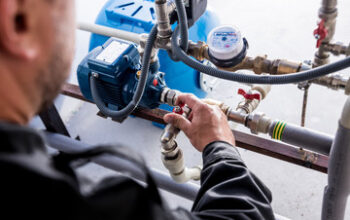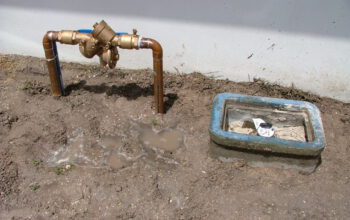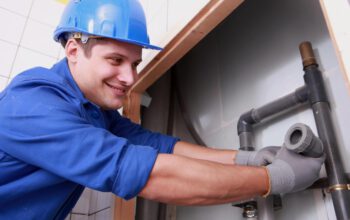Plumbers Lexington KY install and repair piping and fixtures such as sinks, toilets, bathtubs, showers, water heaters, and more. They also work with blueprints and construction teams to ensure plumbing is integrated seamlessly into new building projects.
Plumbers must have excellent customer service skills to listen to their clients’ needs and provide advice, recommendations, and estimates for plumbing services. They must also have great coordination skills to manage multiple tasks at once in high-pressure situations.

In the construction industry, plumbing is one of the trades that are essential for a building to be considered complete. This is because a functional plumbing system is necessary for the distribution of water and removal of wastes. Plumbers install, repair, and maintain these systems. They work on a wide range of projects, from residential to commercial. During the installation process, plumbers take into account local building codes and regulations to ensure that all plumbing components are safe and secure.
The first step to becoming a plumber is obtaining your certification. This entails completing an apprenticeship program and meeting educational requirements. Once you have met these requirements, you can then apply for a license. Different states have different licensing requirements, so it is important to research the specifics of your state’s laws.
Once you have passed the licensing exam, you can start working as a plumber. You may also be required to undergo a background check before being approved for employment. This is to make sure that you are not a threat to public safety. You should also be prepared for interview questions that may focus on your previous experience in the industry, as well as how you would handle certain situations or problems.
During the rough-in phase, plumbers locate all of the supply and waste pipes that will run through the building. These include hot and cold water pipes, gas lines for kitchens and bathrooms, and vent stacks. During this stage, it is crucial that plumbers are accurate and careful when measuring and cutting pipe lengths to avoid mistakes that could cause costly leaks down the line.
After the piping has been laid out, plumbers will cover it with plastic sheeting to protect the floor and walls from any potential damage. Once this is done, they will start to assemble the pieces. This includes installing faucets, toilets, sinks, showers, and water heaters. Plumbers will also test their installations to make sure that everything works as intended.
For residential jobs, plumbers will often work on new construction or renovation projects. They may also be called in to inspect existing plumbing systems for leaks or other issues. It is important for homeowners to have their plumbing inspected regularly, as even small leaks can lead to major problems down the road if not repaired quickly.
Maintenance
Whether in homes or commercial buildings, plumbing maintenance services help to ensure that the water system is working as efficiently as possible. This reduces operating costs for metered water lines and prevents expensive and disruptive repairs.
Plumbers can find and fix issues like leaky pipes, clogged drains, and faulty toilets. Routine inspections can also help to prevent major problems by catching them early on. A good home plumbing maintenance schedule includes a visual inspection of the interior of all pipes and fixtures, testing water pressure, examining toilet components, drain and sewer line cleaning, and replacing worn parts to prevent clogs and breaks.
Plumbing maintenance can be a time-consuming process, so hiring a team of qualified and experienced plumbers is essential to ensure your clients receive the best care. To attract qualified candidates, your company must have a strong marketing strategy to promote the benefits of being a maintenance plumber and offer competitive salaries and benefits.
Your company must also provide training for new hires to build their skills and boost retention rates. A comprehensive training program can help them become licensed and certified, which in turn boosts employee morale and increases their earning potential. Moreover, training can enable your technicians to upsell your company’s maintenance plans and services to customers.
Creating an effective standard operating procedure (SOP) for your plumbing maintenance can help to streamline and organize the entire process. ClickUp’s SOP template offers a simple and efficient way to manage plumbing maintenance, including custom fields, a Board view, and more features that allow for smooth communication and collaboration between all stakeholders in the process.
A professional plumbing maintenance service can save you money, conserve water and resources, and protect your health by identifying and fixing minor issues before they cause major damage. In addition to conducting regular visual inspections and routine cleaning, a plumbing maintenance plan should include checking for signs of water leaks, adjusting water temperature settings, removing mineral deposits, clearing drain lines and sewer lines, and treating hard water with a water softener to prolong the life of your plumbing systems.
Repair
Plumbing systems are complex and can cause major problems when they are not functioning properly. Plumbers repair and maintain these systems, including pipes, fixtures and appliances like sinks, toilets, showers and water heaters. They also inspect systems to ensure they comply with building codes and regulations. Plumbers use a variety of tools and techniques to diagnose and fix issues with pipes, valves, drains and other components.
Some plumbers specialize in residential or commercial plumbing. Residential plumbers work on plumbing systems in homes and apartments, while commercial plumbers tend to work on larger-scale projects such as office buildings, hotels and restaurants. Both types of plumbers may be called upon to repair a wide range of issues, from fixing a clogged toilet to replacing an old water heater.
Plumbers are also often called on to install or replace gas lines. This involves working with hazardous materials, so it is important for plumbers to be knowledgeable about safety precautions and best practices. They must also be able to read and interpret blueprints in order to properly install plumbing fixtures and components.
When pipes burst or start to leak, it can lead to significant damage if not addressed quickly. This is why it is important for homeowners and business owners to know who to call in the event of a plumbing emergency. Plumbers are trained to respond quickly to urgent situations and can assess the damage and make repairs accordingly.
Whether you have a leaky faucet or an overflowing drain, there are certain steps you can take to minimize the risk of further damage until a plumber arrives. The first step is to turn off the water supply to the affected area. Once this is done, you can start to remove any debris that has accumulated in the area. You should also clean up any water that has accumulated on surfaces, as this can help prevent further damage.
In some cases, it may be necessary to use a special tool called a pipe locator to locate the source of the leak. If the plumber determines that the pipe is broken or damaged, they can recommend a repair method and schedule an appointment to complete the job.
Inspection
Plumbing inspections are a great way to catch potential problems before they become serious and costly. As the old saying goes, “an ounce of prevention is worth a pound of cure.” The plumber will check everything from your piping and fixtures to your water heater and sewer line. They’ll evaluate the condition of your plumbing components, identify any problems and provide recommendations for repairs.
The inspection process varies depending on the extent of the work and what is being inspected. Plumbers typically start with a visual evaluation of faucets, showers, and toilets to look for leaks and other issues. They’ll also assess how well your pipes drain and make sure all appliances, like your water heater, are properly connected. They may use a camera to inspect hard-to-reach areas or for more detailed assessments of your sewage system or other pipe conditions.
After the inspection, your plumber will give you a report with their findings. This will include a description of any problems or concerns, the suggested solutions and their cost, and estimated timelines for each. They’ll also recommend preventive measures to help you avoid future problems.
Some of the common preventive measures they’ll recommend include fixing leaks, repairing or replacing clogged drains and sewer lines, and addressing any other issues that might be causing trouble. They’ll also offer advice on how to improve your overall plumbing efficiency, which can save you money on your utility bills.
A plumbing inspection is a valuable investment for any homeowner. Regular inspections can help you avoid costly repairs, maintain your home’s value, and keep your family healthy and safe. In addition, identifying and addressing plumbing issues early on can help you avoid expensive property damage, water leaks, mold growth, unhealthy indoor air quality, and environmental degradation. Regular plumbing maintenance can also lower your water consumption and contribute to conservation efforts.



